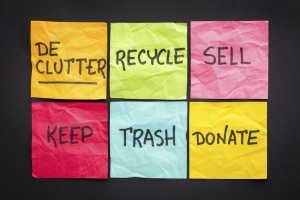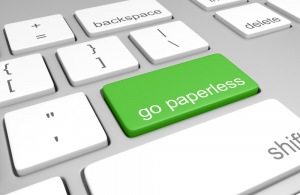How to Declutter: Top Tips to Follow
18 June 2020
With people spending more time at home in light of the recent COVID-19 pandemic, we have seen a surge in orders for skip hire. 
Many people are using this time to have a good clear out and get organised at home. But decluttering can be a huge undertaking and just the thought of it can make us want to run a mile.
So, with years of experience under our belt, we’ve put together some top tips on how to declutter your home. If you put your mind to it, you can achieve a huge amount – without it ending up as the headache you were anticipating.
1. Be Prepared
If you are not prepared, it is easy to lose motivation and give up at the first hurdle. Before you even start work, think about what you will need – bin bags, storage boxes, sticky labels and a marker pen.
If you have accumulated a lot of stuff, or bulky items, you need to get rid of, consider hiring a skip bin. It will make the job much easier if you can simply toss unwanted items out of the way, into a skip. Plus, it’ll save you a lot of time in trips to the local dump.
2. Be Methodical
Be methodical in your approach. If you look at your whole house as one huge project, you’ll likely find it too daunting. Instead, break it down into chunks. Think about the rooms you most want to declutter and tackle them in order of priority, one room at a time. “Eat an elephant in small bites,” as the saying goes.
3. Create a Task List
Creating a task list will help to keep you focused on the tasks at hand. And there’s nothing like the satisfaction of ticking off a list item to keep you motivated!
4. Create Piles
When sorting through each room, create 3 piles:
– Keep
– Donate
– Dump
Use a labelled box or bin bag for the ‘donate’ and ‘dump’ items, so you can easily transport them.
Being organised will really help the sorting process.
5. Work Systematically Through Each Room
Taking every item out of every cupboard and draw is ineffective, tedious and overwhelming. Instead, work systematically through each room.
Start with one particular drawer, or shelf. Remove the items you no longer want, or which don’t belong in that specific place, and add them to the relevant pile (be it ‘keep,’ ‘donate,’ or ‘dump’). Then tidy remaining items you want to keep in that drawer or shelf, before moving onto the next.
Put the ‘donate’ and ‘dump’ items straight into the relevant box or bin bag and carry them outside, to create space. Tidying a room will prove a much easier task if you have more space to work in and are not inundated with ‘stuff.’
Once you’ve sorted every nook and cranny of the room, it’s time to find suitable storage places for the ‘keep’ pile.
6. Ask Yourself 5 Key Questions
When determining whether an item is for the ‘keep,’ ‘donate’ or ‘dump’ pile, ask yourself 5 key questions:
– Do I still use / wear this item?
– Does this item hold any true sentimental value?
– Do I love this item?
– Am I likely to fix or upcycle this broken object?
– Would this item be of use to someone else?
Your home should be your haven. Only keep things that add value to your life. As William Morris famously said, “Have nothing in your house that you do not know to be useful, or believe to be beautiful.”
7. Get Rid of the Guilt
Many people hold on to unused, unloved items as they harbour a sense of guilt. Feelings of guilt can be hard to get rid of. But guilt is wasted energy; it is not going to change the outcome.
You may feel remorseful about throwing out an item that was given to you as a gift. But there is no need to. Think about it; the gift has already been given and appreciated. And no doubt you thanked the person who gave it to you. The gift has served its purpose and it is now yours to do with as you wish.
Or you might be hanging on to an item simply because you feel shame in spending hard-earned dollars on something that’s now going to waste. So, think about it in a different way; the money has already been spent. And it’s already being wasted as you’re no longer using or loving the item. So, learn from your mistake, jettison that guilt and move on.
8. Be Ruthless
Remember, decluttering is not about shifting your clutter from one room to another. You will need to be ruthless!
According to various psychological studies, the benefits of decluttering are plentiful. They include:
– Reduced stress and anxiety
– Improved concentration
– Increased motivation and energy
– Improved sleep
– Improved happiness
This is reason enough to be ruthless!
9. Go Paperless
Going paperless will not only reduce ‘mess,’ but it is also kinder to the environment and will help to divert waste from landfill.
Switch to digital invoicing and opt to receive bank statements and utility bills online. And keep lists and notes on your phone or computer, rather than using pads or post-it notes.
10. Create Structure
Create structure when arranging your belongings. Think logically about where items should be placed for ease of access / use.
In the kitchen, for example, store your pots and pans near the stove and baking tins near the oven. And group foods categorically; tinned foods should be stored together; as should cereals, grains and nuts; and baking ingredients.
In your bedroom, arrange your clothing by garment type and colour and use separate drawers or shelves where possible.
11. Use Storage Solutions
Storage solutions provide an easy way to create structure and keep your home tidy. They can also save space and create additional storage.
Storage baskets are perfect for arranging cosmetics and toiletries in your bathroom drawers, while document folders and lever-arch files are great for storing paperwork neatly.
If space is limited and you need to create more storage, consider erecting wall shelves, using a storage chest as a coffee table, or even hiring a storage unit if you have lots of items you need to house.
12. Create Clutter-Free Zones
Creating clutter-free zones will help to maintain a sense of order within your home or office.
Done properly, it will also create the impression of a tidy environment. Key areas to keep clear include kitchen and bathroom benchtops, as well as dining tables.
Create a designated area, such as a drawer, for miscellaneous clutter, including keys, spare batteries and unopened mail.
A tidy environment will also do wonders for your mental health. Afterall, “a clear space equals a clear mind,” as the old adage goes.
And having decluttered, now is the perfect time for a good spring-clean!
If you would like to hire a skip bin while decluttering your home or business, use our easy online booking system to order you skip now.











